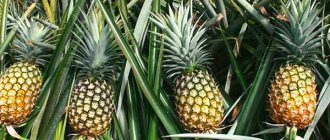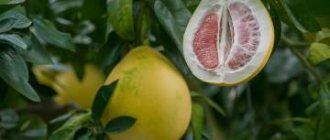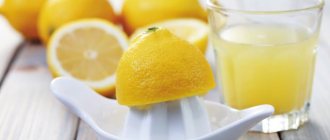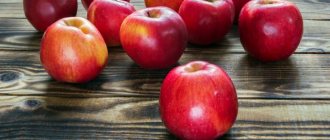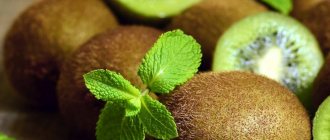General information
Is pineapple a fruit, vegetable or berry?
It's actually grass. Some breeders claim that it is a fruit, but they agree that the compound fruit is not a berry, vegetable or grain.
Content:
- General information
- Beneficial features
- Chemical composition
- The harm of exotics
- How to peel a pineapple
- Pineapple diet for weight loss
- Pineapple selection criteria
- Conclusion
When mature, the pineapple has a low, mundane stem with stiff, toothed leaves that reach 80 cm in length. The fruit of a tropical perennial is golden yellow. Depending on the variety, it can weigh 2–15 kg and reach 10–30 cm in height. Visually, the inflorescence resembles an oblong cone and consists of many ovaries. The top of the fruit is decorated with a green top.
The exotic fruit has a sweet and sour taste, which is why it is used in cooking as an additional ingredient in salads, pizza, desserts, candies and other dishes.
Pineapple plantations are concentrated in countries with subtropical and tropical climates. The world leaders in growing herbaceous plants are Costa Rica, Brazil and the Philippines [1].
The Myth of Bromelain
Pineapples have gained wide popularity not at all because of their dietary qualities. For a long time, one of the substances contained in pineapples was mistakenly attributed with unique fat-burning properties
.
Pineapple does contain a plant digestive enzyme from the group of proteases - bromelain
.
In the human body, it performs an important function - it promotes the digestion of meat foods, breaking down proteins. Due to this property, bromelain isolated from pineapple is often used in the food industry to soften tough meat. Sometimes it is even added to ready-made marinades. The packaging of such products always contains a warning that marinating for too long will change the texture of the meat and make it tasteless. However, from a chemical point of view, bromelain is absolutely powerless against fats
- especially those accumulated on the waist and hips.
All this substance can do to help the body is to digest proteins from a meat dish and relieve the feeling of overeating and nausea. Dietary supplements based on bromelain will not help either
.
Don't believe the advertising: they do not dull the feeling of hunger and do not help you lose weight. Scientists have found other beneficial properties in bromelain. This substance reduces blood clotting and has anti-inflammatory and anti-cancer effects. However, antioxidants, which are found, for example, in leafy vegetables and berries, cope with this task just as well as it does. Important: due to the effect that bromelain has on the blood, pineapples are not recommended for pregnant women
to avoid uterine bleeding!
Beneficial features
The nutritional value of ripe fruit is unique. No other fruit has such an interesting composition. Pineapple is a combination of vitamins and microelements vital for the body (see paragraph “Chemical composition”), so it is rightfully considered a “tropical pharmacy”.
Effect on the body [2][3]:
- lowers blood pressure, thins the blood, dissolves cholesterol plaques;
- increases immunity, relieves inflammation of the nasopharynx, eases the course of the disease, suppresses cough, removes phlegm;
- improves metabolic processes in the body, improves digestion;
- binds free radicals in the body, prevents the spread of metastases;
- dissolves fibrin plugs in varicose veins;
- restores psycho-emotional balance, improves mood, fights stress, energizes;
- removes excess fluid from the body, promoting weight loss.
In addition, the exotic fruit has an anti-cellulite effect, so it is often included in body creams. It removes toxins, improves microcirculation in tissues, and also destroys fat deposits. This unique product helps eliminate excess oily skin and age spots, and also prevents inflammation, so it is used to care for the neck and face area. Masks and scrubs are made based on pineapple juice, which smooth and refresh the dermis, restore its elasticity, and cleanse the pores of the stratum corneum.
Pineapple helps in the treatment of many diseases, including [2][3]:
- arthritis;
- bronchitis;
- pneumonia;
- pancreatic diseases;
- pathologies of the liver and kidneys;
- myocardial infarction;
- hypertension;
- atherosclerosis;
- cardiovascular diseases;
- pathologies of the gastrointestinal tract;
- neurological disorders;
- ARVI;
- painful menstruation.
Chemical composition
85% of pineapple pulp consists of water and 15% of organic acids (citric, tartaric, malic) and monosaccharides (sucrose, fructose, glucose). In addition, the fruit contains vitamins, macro- and microelements, beta-carotene, fiber, and bromelain. Despite the high percentage of simple sugars (up to 18%), pineapple is a dietary product. 100 g of the edible part of a fresh fruit contains 52 kcal [4], canned – 60 kcal [5], dried – 281 kcal [6].
Fresh exotic fruit is quite filling due to its fiber, which instantly suppresses hunger, which is why the fruit is often used in weight loss diets.
The ratio of BJU (proteins, fats, carbohydrates) in pineapple pulp is 0.3: 0.1: 11.8 g per 100 g of product. Table No. 1 “Chemical composition of pineapple” [4]
| Nutrient name | Content, mg per 100 g of product pulp |
| Vitamins | |
| Ascorbic acid (C) | 11 |
| Niacin (RR) | 0,4 |
| Pantothenic acid (B5) | 0,16 |
| Pyridoxine (B6) | 0,1 |
| Thiamine (B1) | 0,06 |
| Retinol (A) | 0,003 |
| Riboflavin (B2) | 0,02 |
| Folic acid (B9) | 0,005 |
| Macro- and microelements | |
| Manganese | 0,818 |
| Potassium | 134 |
| Silicon | 93 |
| Rubidium | 0,063 |
| Sodium | 1 |
| Calcium | 17 |
| Phosphorus | 8 |
| Magnesium | 13 |
| Iron | 0,3 |
| Chromium | 0,01 |
Fresh exotic fruit is of greatest value to the human body. The canned fruit is deprived of all vitamins and microelements, and the dried fruit contains a colossal amount of sugar, which interrupts reasonable arguments about the benefits of such a product. Don’t be tempted by candied fruits either, as they are colored. In addition, the number of calories in them is off the charts, but the benefits are zero. As a result, products made from dried pineapple are veiled food waste that clogs the body.
Health Benefits of Pineapples
Below we take a closer look at 8 impressive health benefits of the fruit in question.
Rich in Nutrients
Pineapples are low in calories but have an incredibly impressive nutrient profile.
One cup (165 grams) of pineapple chunks contains:
Calories : 82.5 kcal Fats : 1.7 g. Proteins : 1 gr. Carbohydrates : 21.6 g. Fiber : 2.3 g. Vitamin C : 131% Manganese : 76% Vitamin B6 : 9% Copper : 9%I Thiamine : 9% Folic acid : 7% Potassium : 5 Magnesium Niacin : 4% Pantothenic acid : 4% Riboflavin : 3% Iron : 3%
Pineapples also contain trace amounts of vitamins A and K, phosphorus, zinc and calcium.
They are particularly rich in vitamin C and manganese, providing 131% and 76% of the daily recommendations respectively.
Vitamin C is essential for growth and development, a healthy immune system and helps absorb iron from the diet. Meanwhile, manganese is a natural mineral that promotes growth, supports healthy metabolism and has antioxidant properties.
Pineapples are filled with a variety of vitamins and minerals. They are especially rich in vitamin C and manganese.
Contains antioxidants
Not only are pineapples rich in nutrients, they are also loaded with antioxidants.
Antioxidants are molecules that help your body fight oxidative stress. Oxidative stress is a condition in which there are too many free radicals in the body. These free radicals interact with the body's cells and cause damage that contributes to chronic inflammation, a weakened immune system, and many harmful diseases.
Pineapples are especially rich in antioxidants known as flavonoids and phenolic acids. Moreover, many antioxidants in fruit are in a bound state. This allows antioxidants to withstand harsher conditions in the body and produce longer-lasting effects.
Pineapples are a good source of antioxidants, which may reduce the risk of chronic diseases such as heart disease, diabetes and some types of cancer. Many of the antioxidants in pineapple are in bound form, so they can provide longer-lasting health benefits for women and men.
Pineapple enzymes may make food easier to digest
Pineapples contain a group of digestive enzymes known as bromelain. They function as proteases that break down protein molecules into their building blocks, such as amino acids and small peptides. Once the protein molecules are broken down, they are more easily absorbed through the small intestine.
This may be especially helpful for people with pancreatic insufficiency or pancreatitis, a condition in which the pancreas cannot produce enough digestive enzymes.
One study found that participants with pancreatitis had better digestion of food after taking an enzyme supplement with bromelain, compared to those who took enzymes without bromelain ().
Pineapples contain bromelain, a group of digestive enzymes that breaks down proteins. It may aid digestion, especially in people with pancreatic insufficiency.
Helps reduce the risk of cancer
Cancer is a chronic disease characterized by uncontrolled cell growth. Its progression is usually associated with oxidative stress and chronic inflammation.
Several studies have shown that pineapple and its compounds may reduce the risk of cancer. This is because they can minimize oxidative stress and reduce inflammation. One such compound is a group of digestive enzymes called bromelain.
In vitro studies have shown that bromelain may also help fight cancer (). For example, two studies have shown that bromelain inhibits the growth of breast cancer cells and stimulates cell death (). In addition to breast cancer, bromelain has been found to reduce the risk of skin, bile duct, gastric and colon cancers ().
Test-tube and animal studies have shown that bromelain can stimulate the immune system to produce molecules that make white blood cells more effective at inhibiting the growth of cancer cells and eliminating cancer cells ().
However, pineapple contains much less bromelain than dietary supplements. More human-based studies need to be done before any conclusions can be drawn about the actual benefits of the fruit for treating cancer.
Pineapple contains compounds that reduce oxidative stress and inflammation, two factors that are detrimental to health. The benefit of pineapple is the presence of the enzyme bromelain, which can stimulate the death of cancer cells and helps the function of white blood cells.
Boosts immunity and suppresses inflammation
Pineapples are not only a healthy fruit, but also have medicinal properties and have been part of traditional medicine for centuries. They contain large amounts of vitamins, minerals, and enzymes, such as the previously mentioned bromelain, which can work together to boost immunity and suppress inflammation.
In one nine-week study, 98 healthy children consumed pineapple every day: the first group 140 grams, the second 280 grams, the third did not consume. The purpose of the study is to find out whether pineapple can boost immunity. Children who ate these fruits had a significantly lower risk of both viral and bacterial infections. In addition, children who ate 280 gr. fruits had almost four times more white blood cells (granulocytes) than the other two groups ().
Another study found that children with a sinusitis infection recovered significantly faster when taking bromelain, compared to standard treatment or a combination of the two (). Moreover, studies have shown that bromelain can reduce markers of inflammation ().
These anti-inflammatory properties of pineapple are believed to benefit a person's health, namely their immune system.
Pineapples have anti-inflammatory properties that can stimulate the immune system.
Relieves symptoms of arthritis
Arthritis affects millions of people around the world, both women and men. There are many types of arthritis, but most are associated with inflammation in the joints. Because pineapples contain bromelain, which has anti-inflammatory properties, it is generally believed that consuming them can relieve pain in those with inflammatory arthritis.
In fact, research dating back to the 1960s shows that bromelain was used to relieve symptoms of rheumatoid arthritis, a type of arthritis that involves inflammation of the joints ().
Several recent studies have examined the effectiveness of bromelain for treating arthritis. One study in patients with osteoarthritis found that taking a digestive enzyme supplement containing bromelain helped relieve pain as effectively as conventional arthritis medications such as diclofenac (). Additionally, one review analyzed bromelain's ability to treat osteoarthritis. He concluded that bromelain has the potential to relieve arthritis symptoms, especially in the short term ().
However, it is unclear whether the bromelain in pineapple can be a long-term treatment for arthritis symptoms. Longer studies are needed before bromelain is recommended for relief of arthritis symptoms.
The anti-inflammatory properties of pineapple may provide short-term symptom relief for people with common types of arthritis.
Accelerate recovery after surgery or heavy physical activity
Eating pineapples may reduce the time it takes to recover from surgery or exercise. This is largely due to the anti-inflammatory properties of bromelain. Several studies have shown that bromelain reduces inflammation, swelling, bruising, and pain that often occurs after surgery. It also reduces markers of inflammation.
For example, one study found that those who consumed bromelain before dental surgery had significantly less pain and felt happier than people who did not. In fact, bromelain provided the same relief as conventional anti-inflammatory drugs ().
Heavy physical activity damages muscle tissue and causes inflammation in surrounding tissues of the body. The affected muscles cannot produce as much force and are sore for up to three days. Proteases such as bromelain are thought to speed up the repair of damage caused by intense exercise by reducing inflammation around damaged muscle tissue. One study tested this theory by giving participants a bromelain digestive supplement after 45 minutes of strenuous exercise on a treadmill. Those who took the supplement had less inflammation and more energy after exercise ().
Several other studies have shown that bromelain may speed recovery from muscle or ligament injury ().
The bromelain in pineapples reduces inflammation, swelling, bruising and pain that occurs after surgery. Bromelinan's anti-inflammatory properties may also promote recovery from intense exercise by reducing tissue inflammation.
Fruits that are delicious and easy to add to your diet
Pineapples are sweet, convenient and an easy fruit to include in your diet. They are available all year round in many supermarkets. They can be purchased fresh, canned or dried.
You can enjoy them as a fruit on their own or mixed into smoothies, salads or homemade pizza.
Pineapples are delicious, affordable, and easy to add to your diet.
The harm of exotics
Considering the fact that pineapple is a tropical fruit unusual for the human body, you need to treat it with caution.
It is dangerous to consume it in the following cases [7]:
- gastritis with high acidity;
- peptic ulcer;
- period of bearing a baby;
- increased sensitivity of tooth enamel;
- the presence of allergic reactions.
Remember: the high content of free organic acids (1.4%) has an irritating effect on the mucous membrane of the digestive tract, as well as on tooth enamel. To avoid tooth decay after eating an exotic fruit, rinse your mouth thoroughly. This will help neutralize the aggressive effect of acids on teeth.
The tropical herbaceous plant is a strong allergen, so it should be given to children aged 6 to 12 years in small quantities (30–50 g per day).
What are the benefits and harms of pineapple for pregnant women?
If you eat the exotic fruit in moderation, it has a beneficial effect on the body of the expectant mother, saturating it with potassium, magnesium, iron, and organic acids. In addition, it is able to overcome nausea and vomiting during toxicosis. The fruit increases hemoglobin levels, fights the dilation of the veins of the lower extremities, improves mood, and relieves heaviness in the stomach.
In the third trimester of pregnancy, pineapple should be consumed especially carefully, since during this period a woman experiences swelling. If consumed frequently, the fruit can cause uterine contractions. Unripe cone-shaped fruits have an abortifacient effect.
A safe dose of pineapple for pregnant women is 50–80 g of pulp [8].
Choose only a high-quality product (see paragraph “Criteria for choosing a pineapple”) and monitor the amount you eat - then the beneficial properties of the tropical fruit will be fully revealed.
Pineapple harm and contraindications
Remember, pineapple is a potential allergen.
Therefore, if there are allergic reactions to fruits, then pineapple is consumed with great caution, monitoring the body’s reaction to its use. It is not recommended to consume the fruit if you have gastritis or gastric ulcer, due to the high content of natural acids.
The fruit has a negative effect on the condition of tooth enamel, so after eating the fruit, it is recommended to brush your teeth or rinse your mouth.
How to peel a pineapple
Some people believe that it is easier to cut the fruit into rings and remove the peel from each circle, while also removing the center. Others argue that this method of cutting leads to the loss of healthy juice, so they insist that you first need to remove the spiky shell, take out the middle with a green cap, then cut the fruit into pieces of the required size.
Let's look at the most effective method of peeling a pineapple (Thai):
- Trim the bottom of the fruit and place the fruit flat on a plate.
- Using a narrow, long knife, remove the skin into thin slices using smooth movements from top to bottom. As a result, dark eyes will remain on the “body” of the pineapple - don’t worry about it.
- At an angle to the continuous curved lines (diagonally), make cuts using a sharp knife on both sides.
- Remove the triangular strip and remove the remaining dark spines, exposing the flesh of the fruit. Repeat this procedure with the remaining rows of growths.
- Place the slices on a plate and serve.
How to eat pineapple
You should not combine fruit intake with dairy products, as this can lead to indigestion [3]. Nutritionists recommend eating fruits separately from other foods, but you should eat pineapple on an empty stomach with caution. It is best to eat the fruit between breakfast and lunch or as an afternoon snack.
Pineapple is added to minced meat, salads, and fried vegetables. It is used to make compote, cocktails, smoothies, jam, and fruit ice.
Eating pineapple during pregnancy and breastfeeding
During pregnancy, it is recommended to consume the fruit with great caution; it is not allowed to eat unripe pineapple. It is the unripe fetus that contains a large amount of bromelain, which increases the tone of the uterus.
During lactation, it is still not recommended to consume pineapple fresh, as well as a canned product. The fact is that it can provoke an allergic reaction in the baby.
Otherwise, there are no contraindications. Pineapple is an excellent substitute for candy and is suitable for light snacks.
Pineapple diet for weight loss
The fruit contains the natural proteolytic enzyme bromelain, which promotes the breakdown of proteins into amino acids, has a mild laxative effect, and also improves digestion. This compound is similar in its action to pepsin and trypsin, the lack of which disrupts the processes of processing and assimilation of proteins, which can lead to the accumulation of extra pounds.
Bromelain compensates for the deficiency of essential enzymes in the human body, preventing the development of obesity. In addition, pineapples have a diuretic effect and block the hunger center. As a result, it becomes easier to control your appetite.
To cleanse the body, nutritionists recommend pineapple fasting days once a week [9]. During the day, you should limit yourself to eating exotic fruits and herbal teas. To do this, peel the pineapple and cut it into four equal parts, which must be eaten throughout the day. In between taking the fruit, drink clean water, fruit infusions (from apples, plums), herbal teas (from corn silk, hellebore, bardakosh, senna, chicory).
A pineapple fasting day will help you get rid of 0.5 to 1 kg of excess weight [9]. This method of losing weight is contraindicated for people with high acidity of gastric juice or peptic ulcers.
After each use of a tropical plant, the mouth must be rinsed with water, otherwise the juice of the fruit may corrode the enamel of the teeth.
Pineapple with vodka for weight loss: is it a super effective remedy or a waste of money?
A tincture based on a tropical fruit is an economical way to quickly lose weight that does not require significant effort or investment. This remedy activates the digestion of food and also removes excess fluid from the body.
Recipe for the slimming elixir:
- Take a quality ripe pineapple, wash it, cut off the bottom and top with leaves.
- Cut it into 4-6 pieces without peeling, place in a blender bowl, and chop.
- Transfer the resulting mass into a glass jar, pour half a liter of vodka, cover with a lid, and place in a cool, dark place (refrigerator, cellar) for seven days.
- After a week, strain the mixture. Throw away the cake - it has already given up all the nutrients.
Take pineapple tincture twice a day, half an hour before meals, a tablespoon (15 ml). The weight loss course lasts three weeks. During this period, you can get rid of 8 to 10 extra pounds. This course is allowed to be conducted no more than three times a year.
Contraindications to using pineapple tincture for weight loss:
- pregnancy;
- lactation period;
- having an allergy to fruit;
- gastritis, stomach ulcer;
- cardiovascular problems;
- nervous disorders;
- cirrhosis of the liver;
- alcoholism;
- diabetes;
- hypotension.
Pineapple recipes
Pineapple is used in cooking not only for desserts. It makes delicious salads and hot snacks. We offer a recipe for French meat with pineapple and an unusual, but very beautiful and tasty version of a pineapple fruit salad for the holiday.
French style meat with pineapple pucks
What do you need:
- pork neck – 0.5 kg;
- pineapple – 1 pc.;
- onions – 0.25 kg;
- hard cheese – 150 g;
- salt, pepper - to taste.
How to cook:
- Wash the meat, dry with a napkin, cut across the grain into one and a half centimeter pieces, and beat well.
- Rub with salt and pepper. Place on a baking sheet.
- Peel and cut the pineapple into rings. To do this, you can use a special device or knife. How to cut a pineapple with washers is described above.
- Cut the onion into thin half rings.
- Cover the pieces of meat with onions and lightly brush with mayonnaise.
- Place pineapple rings on the pieces of meat and brush with mayonnaise.
- Cover with grated cheese.
- Place in an oven preheated to 180-200 degrees and bake for 35-40 minutes.
Meat baked with pineapples and cheese will decorate any holiday table, regardless of the occasion for which the feast is organized.
Pineapple selection criteria
Before purchasing an exotic fruit, pay attention to the following parameters:
- ripeness (the skin on the spherical sections and at the base should be golden yellow);
- freshness (the surface of a high-quality fruit is hard, pressed slightly when pressed moderately hard).
There is an opinion that an indicator of the ripeness of a pineapple is the ease of pulling the leaf from the top. This is actually a myth. The easier the leaf is pulled out, the longer the fruit lies on store shelves, which indicates that the product is stale.
Remember: pineapple, unlike mangoes or bananas, does not ripen over time.
The fruit must ripen naturally: only in this case will it have a sweetish taste, an orange-yellow color without green veins, a flat surface of the “eyes” and a pleasant aroma. The tail of a ripe pineapple comes in one tuft, has smooth green edges, and is no more than twice the length of the fruit (usually 10 cm).
Best materials of the month
- Coronaviruses: SARS-CoV-2 (COVID-19)
- Antibiotics for the prevention and treatment of COVID-19: how effective are they?
- The most common "office" diseases
- Does vodka kill coronavirus?
- How to stay alive on our roads?
If the spheres have soft areas where the skin is discolored, wrinkled, juice leaks, a vinegary smell has formed at the base, and the leaves at the top have dried out and turned brown, the fruit is spoiled and is not suitable for consumption.
